A LEADING regional forestry research identity has described advances in softwood and hardwood tree-breeding research as achieving “breakthroughs” for industry.
Southern Tree Breeding Association general manager Dr Tony McRae said the breakthroughs were achieving real dollars for plantation owners and timber processors in the region.
“We are now growing trees faster, with smaller branches, straighter and with better wood properties,” Dr McRae said this week.
He said researchers were now using DNA technology to identify the physical attributes of trees.
This is considered a game-changer for industry given “new generation” seedlings could have their DNA tested in the nursery before they were planted in the field.
This is expected to speed up the process of rolling out new generation trees by a number of years.
“What we have been able to do last week is combine the DNA information on individual trees and families with physical characteristics data on a commercial scale breeding program,” Dr McRae told The Border Watch.
“We can now make more gains by using those pieces of information – this is a first for trees internationally.
“They have been doing it in the lab in universities, but they have not done it on a commercial operations scale.”
While it has been initially developed for the hardwood sector, it is hoped the method can be transferred to the radiata pine industry.
He said other advances included new technology that allowed the industry to use a cutting-edge high-tech drill – known as a resistograph – to test the stiffness of the timber in standing trees.
This is considered vital because it predicts the strength of the timber in the future for the sawmilling process.
Funded by Forest and Wood Products Australia, the two year research project was put under the microscope this week by a delegation of scientists, foresters and processors from around Australia.
Walking through a research softwood progeny plantation site this week near Mount Gambier, the researchers witnessed a demonstration of the tool.
It is hoped the new technology will drive increased returns of thousands of dollars per hectare for plantation owners in the future.
Dr McRae said the genetics trial site of 7000 softwood trees was already assessed in a plantation near Mount Gambier.
This trial is cutting edge research into the development of a “new generation” of trees through the science of genetics.
“This research is very important because when sawmills process a log they differ in their attributes – and that impacts on money,” Dr McRae said.
“So what we are trying to do here is improve the variety of trees so when they are harvested they produce a more uniform log with better properties.”
He said research into producing better trees had been ongoing in the region for 75 years.
“Research is getting more and more important because when you talk about trees, we just do not talk about their attributes, but we rank them in their importance as to how much money they are worth,” Dr McRae said.
He said the progeny of the new generation of trees would then be rolled out into new plantations.
“If we pick the very best ones, we could probably increase the growth rate up to 30pc,” Dr McRae said.
But he said it was also important not to just pick the fastest growing trees as seedlings as this could compromise wood quality – it’s a trade-off between quality and growth rate.







